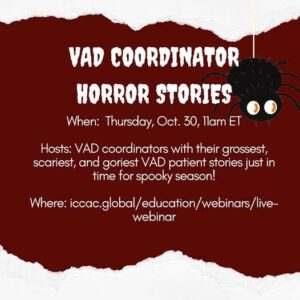ICCAC’s ‘Goriest LVAD Stories’ Event Erodes Patient Trust
November 7, 2025
ICCAC’s gory LVAD story event may be driving patients to lose trust in coordinators.

A few weeks ago, an LVAD patient forwarded me a Halloween-themed social media post from the International Consortium of Circulatory Assist Clinicians (ICCAC) – an organization of VAD coordinators who administer the VAD-C exam. The post describes a virtual gathering for VAD coordinators to share “their grossest, scariest, and goriest VAD patient stories.”
How does this help LVAD patients? Would a patient seeing the ICCAC post have more or less trust in their VAD coordinators? Does an event like this promote empathy and humanism in healthcare?
Imagine a patient sitting in her gynecologist’s office. She sees a flyer on her doctor’s desk asking the doctor to attend an event to share their “grossest, scariest, and goriest” patient stories. Would it be reasonable for that patient to lose trust in her doctor?
A large portion of the LVAD community relies on SNAP and other government benefits, which will probably not be available for at least one month. Who knows what is happening with health insurance and rural hospitals? Is there no real work to be done?
A French health study indicates that LVAD patients are about 20 times more likely to attempt suicide than the average patient with a chronic illness. LVAD patients chose to unplug from batteries and die in their sleep instead of facing the challenges of another day because they lack mental health support from their healthcare teams. Instead of addressing any of these real challenges, ICCAC advertises a gathering to share gory patient stories. Is April Fools reserved for the funniest patient deaths?
Living with an LVAD isn’t about the device at all. The surgery hurts, and it’s a pain to carry around the weight – but it’s not the end of the world. The real challenge of survival with an LVAD comes in the middle of the night when you’re all alone. When all you can hear is the humming of your heart. For some patients, the only thing keeping them comfortable through the solitude of night is the idea that they have a team they can trust come morning. As soon as the sun comes up, they can email or call someone for help. What happens when they can’t trust those people anymore?
A favorite quote from my time studying history comes from William Faulkner’s The Hamlet. “Only thank God men have done learned how to forget quick what they ain’t brave enough to try to cure, he told himself, walking on.” See a problem? Choose silence. Bury your conscience. Continue your life. You’ll forget about it quick enough.
Some of us can’t forget.
-Phil Morton